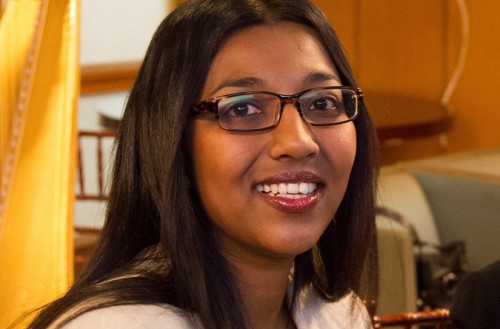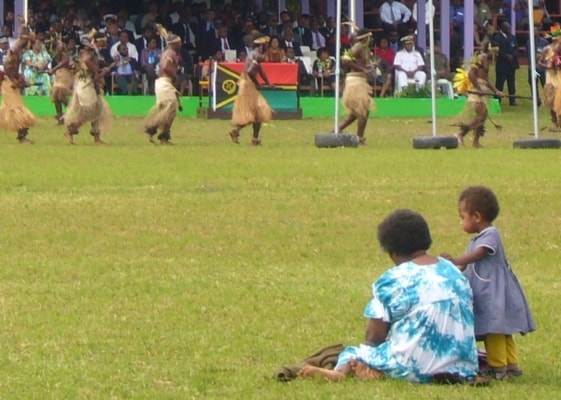Guest blogger Priya Chattier speaks at DLP’s 2016 Annual Conference at La Trobe University in Melbourne on Monday 8 February. Her post here begins a short series on the conference theme: Power, politics and positive deviance.
Fiji’s parliament – as in other legislatures in both developed and developing countries – is marked by a glaring absence of female faces. Women in Fiji have the right in principle to vote and to run for political office, but their invisibility in national politics suggests that sexism and misogyny still deter many.
Fiji’s disparate communities disgree on many issues but many share, to a greater or lesser degree, a widespread resistance to women’s participation in public life that has persisted long beyond the independence Fiji won in 1970. However, Fiji’s 2014 elections, the first since the military coup in 2006, brought some good news; 44 women stood for election to the 50 seats being contested, and eight were elected.
All but one represented a political party. Roshika Deo declared early on in the election campaign that she would stand as an independent. A gutsy young feminist, and campaigning in a culture where political support is usually very closely allied to ethnic and clan networks, she predictably failed to win a parliamentary seat. But did her strategies have other transformative outcomes that qualify her as a positive deviant?
At the 2016 DLP Conference in Melbourne next week, I will argue that her exceptional performance – despite facing similar and, in some ways, much worse constraints than other female candidates – makes her exactly the kind of outlier that the concept of positive deviance challenges us to recognise. Her unconventional electoral strategy may offer new insights into existing discourses on women’s underrepresentation in Pacific legislatures, and there is evidence that some now see Roshika Deo as an archetype for the future female electoral candidates Fiji needs.
Even before she launched her electoral campaign, the former lawyer and NGO worker was already a high profile activist who had attracted much attention. She created ‘Be the Change’ to underpin her candidacy, a social media platform that encouraged women and young people to embrace, celebrate and promote democratic change and social justice through social media.
Her decision to stand as an independent – rejecting serious offers of support from mainstream parties who wanted her to join their camp – soon attracted immense hostility. She was accused of manipulating the gender card and presenting a sensationalist ‘victim’ view of Fiji’s women.
In reply, she insisted that she could not in all conscience join any of the established political parties. “We wanted change, and so we started ‘Be the Change’ campaign that stood firm on issues of LGBTIQ, women’s rights, mental health, sexual and reproductive human rights of women and men, amongst other issues. None of the established parties had a firm or clear stand on these issues,” she said.
Her opponents attacked her through the gender stereotypes of both traditional culture and religion. As a young woman running her own political campaign, she was cast as someone who must therefore disdain all women who chose to accept a more traditional role in Fiji society. The misogyny, harassment and cyber-bullying she faced was not subtle; for instance, her face was photo-shopped into an image of the fierce Hindu goddess Kali, semi-naked and surrounded by skulls.
Yet as a challenger of the gender status quo, her ‘deviant’ image helped her garner immense popularity among voters of various ethnic, racial, and sexual identities. She campaigned openly against homophobia and transphobia, building a huge support base among Fiji’s LGBTIQ community, effectively creating her own electoral constituency and bypassing Fiji’s traditional electoral cleavages. One indicator is the number of ‘likes’ her campaign’s social media page attracted – 14,391, only bettered by the pages of the eventually victorious party and its leader. Her ‘Be the Change’ campaign became the social media voice of Fiji’s younger generation, swelling the debate around human rights violations suffered by marginalised groups and the widespread, culturally based norm of discrimination against women and girls. Be the Change continues to be active on such issues, suggesting that it has a life and legacy beyond the election.
Over the last decade she has been a leading figure in a number of controversial events that have challenged traditional social and gender norms: a key speaker at Fiji’s protest meeting to mark the global “One Billion Rising” campaign; playing a key role in the “Take Back the Streets Fiji” movement; being closely involved with Fiji’s first ever production of The Vagina Monologues. Little surprise, then, that when she decided to stand for parliament, she was unwilling to sever her ties to Fiji’s vulnerable and marginalised communities.
Her rebellion against misogyny has connected and bonded her with many young Fiji women and men online where, she says, they do not feel intimidated by their communities and so feel able to challenge chauvinistic attitudes and perceptions. On polling day, it became clear that she had built solid popular support – much more than many seasoned popular politicians who won fewer than 1000 votes. Her 1055 votes put her in 70th place out of 251 candidates.
It is also worth noting that leading women candidates such as Ro Teimumu Kepa and Tupou Draunidalo were able, like male politicians, to depend on voter support prompted by clan (mataqali) and kinship ties; yet, despite their success, Roshika Deo’s ordeal suggests that Fiji’s political culture is still quite masculine. Gender norms around female leadership remain resistant to change and, as in other Pacific island countries, society certainly continues to struggle with the idea of women as leaders in the national parliament.
But Deo’s public profile remains high and even her electoral opponents acknowledge her influence. In an interview for a political party research project, Jiko Luveni – a member of the FijiFirst party which won the 2014 election, and the first woman to hold the post of Speaker of the House – said:
“Roshika Deo was an independent candidate and she went on her own despite all the odds. Even though she couldn’t get in, she still stands out as an excellent role model to many women, young and old.
[There is a] need for qualified women – ‘women of substance’- who can debate and talk about issues in parliament. Fiji needs young women like Roshika Deo who are passionate about politics.”









